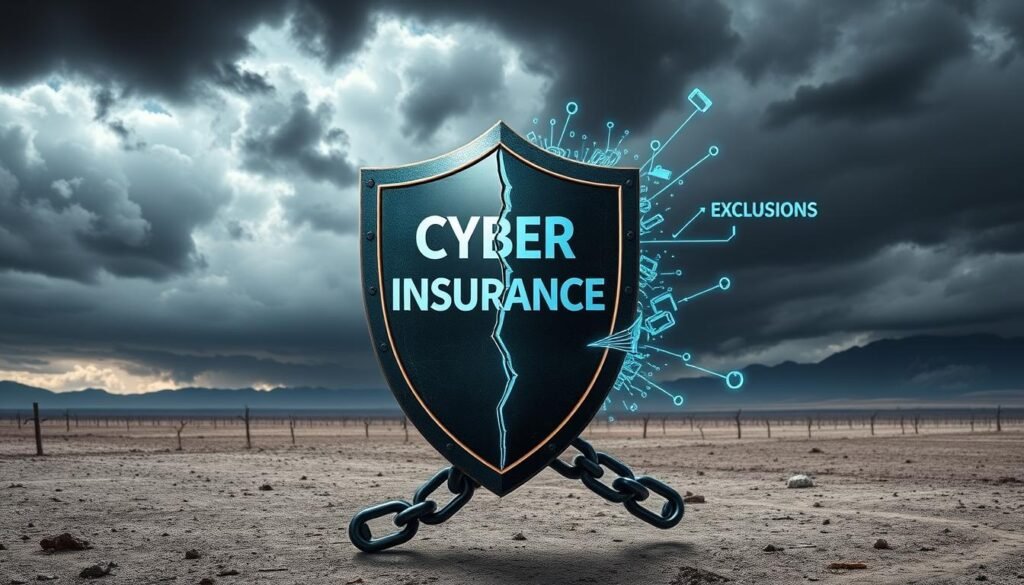In 2022, a shocking 27% of data breach claims were denied because of Cyber Insurance policy exclusions1. This shows how vital it is to know what Cyber Insurance doesn’t cover. With more businesses online, they face many cyber threats like ransomware and data breaches. Cyber Insurance helps, but many don’t know about the exclusions that leave them exposed.
Cyber Insurance often doesn’t cover physical damage from cyber attacks or the loss of future profits1. It’s key for businesses to understand these exclusions. This way, they can make sure they’re covered and ready for cyber risks.
Key Takeaways:
- Cyber Insurance policies often don’t cover physical damage from cyber attacks.
- Improvements or new tech after a cyber attack aren’t usually covered.
- Future lost profits from data loss or theft of intellectual property aren’t insured.
- Cyber attacks by nation-states are usually not covered by Cyber Insurance.
- Businesses doing illegal or fraudulent activities might have claims denied.
Cyber Insurance: Safeguarding Businesses in the Digital Age
In today’s digital world, all businesses face cyber threats. Ransomware attacks and data breaches are common and risky. Cyber insurance is key, helping protect businesses from financial and reputation damage2.
Cyber insurance covers many costs from cyber attacks. This includes legal fees, ransom payments, and incident response costs. It also covers business interruption losses and reputational damage. This lets businesses focus on their work, knowing they’re financially safe2.
Ransomware attacks and data breaches pose significant risks
The increase in cyber incidents makes cyber insurance vital. Ransomware attacks and data breaches can cause huge financial and legal problems. They also harm a company’s reputation23.
Cyber Insurance covers financial losses and expenses
Cyber insurance protects against many cyber risks. It offers cyber incident financial protection and cyber insurance policy coverage. It also covers financial loss protection and cyber incident expense coverage. This helps businesses bounce back fast after an attack, keeping their operations and reputation safe2.
“Cyber insurance has become an essential tool for businesses in the digital age, providing a safety net against the growing threats of ransomware, data breaches, and other cyber incidents.”
Coverages Included in Cyber Insurance Policies
Cyber insurance policies protect businesses in the digital world. They cover network security and privacy liability. This means financial help against legal claims and damages from data breaches or unauthorized access4.
Cyber Extortion
Cyber extortion coverage helps with ransom payments and other costs. It includes expenses for negotiating with cyber attackers and legal and tech costs4.
Crime and Social Engineering
This coverage helps with crimes like funds transfer fraud and phishing. It’s for when attackers use stolen info or trick people into giving money4. In 2022, small business claims for funds transfer fraud went up by 56%5.
Data Breach Response
Data breach response coverage covers the costs of fixing after a breach. This includes notifying people, doing IT forensic investigations, and credit monitoring4.
Business Interruption
Business interruption coverage helps with lost income during downtime. It ensures businesses don’t suffer long-term financial harm. Cyber insurance usually offers 180 days of coverage for this5.
Digital Asset Damage
Digital asset damage coverage pays for rebuilding websites and networks. It also covers data recovery4.
Reputational Damage
Reputational damage coverage helps with PR and crisis management. It’s to fix reputation damage and regain customer trust. But, not all cyber incidents are covered by this5.
| Coverage | Description |
|---|---|
| Network Security and Privacy Liability | Provides financial protection against legal claims and damages resulting from alleged negligence in protecting sensitive information or failing to prevent unauthorized access to computer systems. |
| Cyber Extortion | Covers the costs of ransom payments, negotiation with cyber extortionists, and other expenses related to cyber extortion incidents, such as ransomware attacks. |
| Crime and Social Engineering | Assists when threat actors use stolen credentials or social engineering tactics to trick people into transferring funds. |
| Data Breach Response | Helps businesses meet the costs of post-breach actions, such as notifying affected individuals, conducting IT forensic investigations, and providing credit monitoring services. |
| Business Interruption | Recovers income lost during the downtime caused by cyber incidents, allowing businesses to avoid long-term financial setbacks. |
| Digital Asset Damage | Pays for rebuilding websites, networks, and intranets, as well as recovering or restoring data. |
| Reputational Damage | Helps businesses pay for public relations and crisis management efforts to mitigate damage to their reputation and restore customer confidence. |

Cyber insurance policies offer many coverages. But, it’s key to know what’s not covered. Businesses should review their policies and think about extra coverage5.
Only 10 to 15% of small and medium-sized businesses have cyber insurance. Yet, cyber attacks on these businesses are becoming more profitable5.
What Does Cyber Insurance Not Cover?
Cyber insurance is key for businesses in today’s digital world. Yet, it’s vital to know its limits and what’s not covered. Cyber insurance exclusions can leave big gaps, mainly for physical damage and tech upgrades6.
Physical Damage to Infrastructure or Equipment
If a cyber attack damages a company’s physical stuff, the insurance might not help with repairs or replacements6. This is because cyber insurance usually doesn’t cover physical harm. It focuses more on digital threats and financial losses. Companies need to make sure they’re covered for physical damage, either with a separate policy or by adding this to their cyber insurance.
Costs for Technological Improvements
Cyber insurance helps get systems back to pre-attack state, but it doesn’t pay for tech upgrades6. These costs are seen as part of doing business and aren’t covered. But, if upgrades are needed after an attack, the policy might help with the costs.
It’s important for businesses to know what cyber insurance doesn’t cover. They should work with their insurer and risk experts to fill these gaps. This way, they can face the changing cyber threat world better678.

| Coverage Included | Coverage Excluded |
|---|---|
|
|
“Cyber insurance typically won’t cover future profit loss after a cyber attack or a decrease in company value caused by digital crime.”
Potential Future Lost Profits: An Uncovered Area
Cyber insurance policies often don’t cover future lost profits well. This includes data loss, reduced market share, and intellectual property theft9. Unlike lost revenue during specific business interruptions, these future losses are usually not covered9.
The cost of dealing with a cyber attack can be nearly $300 million. Yet, many businesses have insurance that only covers up to $100 million9. This gap can leave companies at risk of big financial losses9.
Cyber insurance mainly protects against lawsuits and regulatory claims from data breaches10. But it often doesn’t cover lost profits from stolen intellectual property or data loss9.
As technology keeps changing, the need for better cyber insurance grows.  Businesses need to check their cyber insurance and think about extra coverage. This is to protect against new cyber threats11109.
Businesses need to check their cyber insurance and think about extra coverage. This is to protect against new cyber threats11109.
| Cyber Insurance Coverage | Limitations |
|---|---|
| First-Party Coverage | May not cover financial fraud from social engineering techniques or the cost of strengthening systems after an attack |
| Third-Party Coverage | Addresses network security and privacy liability, regulatory liability, PCI fines, regulatory fines and penalties, and media liability |
| Business Interruption Coverage | Compensates for income loss and extra expenses due to security events or unplanned outages |
| Potential Future Lost Profits | Generally not covered by standard cyber insurance policies |
“Cyber insurance mainly protects against lawsuits and regulatory claims from data breaches. But it often doesn’t cover lost profits from stolen intellectual property or data loss impact on a company’s competitive position.”
By understanding cyber insurance’s limits and filling the gaps, businesses can strengthen their risk management. This helps protect their finances against new cyber threats11109.
Pre-Existing Conditions and Cyber Attack Disclosure
Businesses must be honest about any past cyber incidents when getting cyber insurance12. If a cyber attack happened before the policy started, the insurer might not cover it12. It’s important to tell the truth about any past cyber attacks or risks during the application process12.
Cyber insurance often doesn’t cover past cyber attacks12. If a business had a data breach before getting the policy, the insurer might not pay for it12. Being open about past breaches helps avoid gaps in coverage12.
Telling the truth is key when getting cyber insurance12. Not sharing known cyber risks can lead to denied claims12. By being honest, businesses can get the right protection for future attacks12.
“Transparency is key when it comes to cyber insurance – businesses must disclose any previous incidents or vulnerabilities to ensure they have the right coverage in place.”
Cyber insurance is vital for businesses today, but it has its limits12. Knowing these limits and being honest during the application helps businesses get the best protection12.
The cost of a cyber attack can be huge13. So, having the right cyber insurance is critical13. Don’t let hiding past cyber issues hurt your business – be open to stay safe1213.
Cyber Attacks by Nation-States: A Complex Exclusion
Cyber attacks by nation-states are a big challenge for cyber insurance policies. These attacks are complex and often need international help to solve14. Many big cybersecurity companies now have strict rules for cyber insurance. A leading cyber insurance company has decided not to cover attacks by nation-states14.
The insurance industry doesn’t want to cover these attacks for two main reasons. First, cyber risks are changing fast and could be too big for insurance to handle14. Second, it’s hard to know who is behind an attack, making it hard to decide if it’s a nation-state14. The insurance company is adding a rule to not cover losses from attacks backed by states14.
The insurance company has to prove if an attack is from a nation-state. This means they don’t make the company buying insurance prove it14. If law enforcement can’t say who did the attack quickly, the insurance company has to prove it. This makes solving the case harder for the insurance company14.
This rule is like health insurance not covering broken bones. It shows that these exclusions might not be enough14. As more attacks happen, the insurance industry needs to find better ways to handle them14.
“64% of security decision makers worldwide believe their business has been targeted or impacted by a nation-state attack, and successful nation-state attacks result in more than $1 million in losses per incident.”15
State-sponsored cyber attacks often use independent cyber attackers. This makes it hard to know if an attack is from a state or not14. Getting proof from these attackers is almost impossible, making it hard to say for sure if a state was involved14.
The cyber insurance industry is facing big challenges with these exclusions14. Lloyd’s of London will stop covering nation-state attacks in April 2023. This means companies in certain sectors need to find other ways to protect themselves15.

Illegal or Fraudulent Activity: A Policy Violation
Businesses need to know that cyber insurance won’t cover illegal or fraudulent activities16. Policies exclude claims from unlawful or unethical practices17. This is because insurers don’t want to cover intentional misconduct17. It’s important for businesses to follow the law and maintain ethical behavior to keep their cyber insurance valid.
Insurers might not pay for claims if they find out about illegal or fraudulent activities17. This includes data manipulation, unauthorized access, or hacking, even if it wasn’t meant to harm17. Companies must focus on cybersecurity and train employees to follow the law and company ethics.
| Coverage Exclusion | Description |
|---|---|
| Illegal Activity | Cyber insurance policies typically exclude coverage for claims resulting from intentional, illegal, or fraudulent activities by the insured. |
| Fraudulent Activity | Insurers may deny claims if they determine that the policyholder was involved in fraudulent activities that contributed to the cyber incident. |
| Ethical Business Practices | Businesses must maintain a strong culture of ethical behavior and adhere to all relevant legal and regulatory requirements to ensure the validity of their cyber insurance coverage. |
To keep their cyber insurance valid, businesses must focus on ethics and follow the law18. By doing this, companies can avoid having claims denied because of illegal or fraudulent actions. This ensures their cyber insurance protects them in case of a cyber attack.
Other Reasons for Cyber Claim Denials
Cyber insurance is key for businesses, but it has its limits. Cyber insurance claims can be denied for many reasons, like not taking enough security steps, going over coverage limits, and losses during the waiting period19.
Failure to Take Proper Precautions
Insurers might not cover claims if a business doesn’t follow basic cyber security. This includes not updating software, using weak passwords, or not training employees19. They might see this as negligence, which can mean no coverage.
Claims Exceeding Coverage Limits
Cyber insurance policies have a cap on how much they’ll pay out. If a business’s losses are more than that, the insurer might not cover the extra19. It’s important to know your policy’s limits to avoid surprises.
Losses During the Waiting Period
Cyber insurance policies often have a waiting period. Insurers might not cover claims for short-term business interruptions19. Having a solid business continuity plan is key to handling cyber incidents and getting coverage.
It’s vital for businesses to understand cyber insurance’s limits. By taking the right steps, checking coverage limits, and planning for business continuity, they can get the most from their cyber insurance.
The cyber insurance world is always changing. Carriers are removing exclusions and adapting to new threats192021. By staying informed and proactive, businesses can ensure they’re covered in the digital age.
| Reason for Claim Denial | Explanation |
|---|---|
| Failure to Take Proper Precautions | Insurers may deny claims if a business fails to maintain minimum cyber security standards, such as neglecting software updates, weak password policies, or lack of employee training. |
| Claims Exceeding Coverage Limits | Cyber insurance policies have limits on the maximum payout, and insurers may deny claims that exceed these limits. |
| Losses During the Waiting Period | Insurers may deny claims for short-term business interruptions, as businesses should have plans in place to weather brief periods of downtime. |
what does cyber insurance not cover
Cyber insurance helps protect businesses from cyber attacks and data breaches. But, it’s key to know what it doesn’t cover. Cyber insurance claim denials can happen if there’s not enough evidence or if the claim is filed too late.
Insufficient Evidence for Claims
When you file a cyber insurance claim, you need the right evidence. This includes incident reports, forensic analysis, and financial records22. Without enough proof, insurance companies might deny your claim22.
Businesses should have a good system for reporting and documenting cyber incidents. This will help make their insurance claims stronger.
Untimely Claim Filing
Reporting cyber incidents late can make it hard to get your claim approved22. Insurance companies have strict deadlines for claims. If you report too late, they might reject your claim.
Businesses should have clear reporting procedures and make sure to submit claims quickly. This way, they can avoid delays and have a better chance of getting their claim approved.
In short, cyber insurance policyholders need to keep detailed records and follow incident reporting requirements closely. This ensures their claims have the right forensic analysis evidence and financial records. If they don’t, they might face cyber insurance claim denials, leaving them open to financial loss from cyber incidents.
Addressing Cyber Insurance Gaps for Complete Coverage
The cyber insurance market is growing fast, expected to hit $29.2 billion by 2027. Businesses need to act quickly to fill any coverage gaps. They can do this by getting extra insurance policies. For example, property damage insurance, social engineering coverage, or media liability insurance can help23.
Securing Additional Insurance Policies
Cyber insurance is key, but it might not cover all cyber risks. Getting extra insurance policies can help. This way, businesses can better manage their cyber risks24. They can add property damage, social engineering, or media liability insurance, based on their needs.
Assessing and Mitigating Cyber Risks
Regular cyber risk assessments are vital to find and fix insurance gaps23. By spotting vulnerabilities and risks not covered, businesses can act fast. They might boost security, train employees, or get more insurance23.
As cyber threats keep changing, businesses must stay alert. With the right cyber insurance, risk assessments, and mitigation, they can face the digital world with confidence2324.
Conclusion
Cyber Insurance is key for businesses to protect against cyber attacks. But, it’s important to know what it doesn’t cover25. Things like physical harm, property damage, and copyright issues aren’t included25. Also, some policies might not cover data breaches from lost devices25.
Businesses need to be proactive in managing cyber risks26. They should check their current protection, calculate risks, and review insurance policies26. This way, they can fill any gaps in coverage and keep their operations safe26.
As technology use grows, so does the need for strong Cyber Insurance and risk management2526. By knowing what Cyber Insurance doesn’t cover and taking steps to improve cyber security, businesses can face cyber threats with confidence2526.
FAQ
What does cyber insurance not cover?
What are the main cyber insurance exclusions?
What cyber risks are not covered by cyber insurance?
When can a cyber insurance claim be denied?
How can businesses address gaps in cyber insurance coverage?
Source Links
- Exclusions in Cyber Insurance Explained | ProWriters – https://prowritersins.com/cyber-insurance-blog/how-does-cyber-insurance-work/
- Surprise! 9 Things Cyber Insurance Coverage Doesn’t Cover – https://www.entechus.com/blogs/things-cyber-insurance-coverage-doesnt-cover
- Cyber Insurance: Safeguarding Your Business in the Digital Age — National Insurance Brokers – https://www.mynationalbroker.com/blog/cyber-insurance-safeguarding-your-business-in-the-digital-age
- What’s Not Covered by Cyber Insurance? | ProWriters – https://prowritersins.com/products/cyber-insurance/coverage-exclusions/
- What does a Cyber Insurance Policy Cover? – https://www.coalitioninc.com/topics/cyber-insurance-policy-coverages
- What Does Cyber Insurance Not Cover? – Trava Security – https://travasecurity.com/learn-with-trava/articles/what-does-cyber-insurance-not-cover/
- Blog | What Does Cyber Insurance NOT Cover? – https://www.netfriends.com/blog-posts/what-does-cyber-insurance-not-cover
- What does Cyber Insurance cover? | Cyber insurance | Choosing the right insurance | ABI – https://www.abi.org.uk/products-and-issues/choosing-the-right-insurance/cyber-insurance/what-does-cyber-insurance-cover/
- Understanding the Basics of Cyber Insurance: What You Need to Know – https://securityscorecard.com/blog/understanding-the-basics-of-cyber-insurance-what-you-need-to-know/
- Cyber Insurance Explained | CrowdStrike – https://www.crowdstrike.com/en-us/cybersecurity-101/exposure-management/cyber-insurance/
- Frequently Asked Questions about Cyber Insurance – https://library.educause.edu/resources/2021/10/frequently-asked-questions-about-cyber-insurance
- What Is Cyber Insurance? Why Is It Important? Risk Coverages | Fortinet – https://www.fortinet.com/resources/cyberglossary/cyber-insurance
- Cyber Liability Insurance For Small Businesses – https://www.forbes.com/advisor/business-insurance/cyber-liability-insurance/
- What To Do About Cyber Insurance Trying To Exclude Nation-State Attacks From Coverage – https://blogs.infoblox.com/security/what-to-do-about-cyber-insurance-trying-to-exclude-nation-state-attacks-from-coverage/
- <strong>Lloyd’s to Exclude Nation State Attacks from Cyber Insurance Coverage</strong> – https://blogs.claconnect.com/Cybersecurity/lloyds-to-exclude-nation-state-attacks-from-cyber-insurance-coverage/
- Cyber Insurance – https://www.ftc.gov/business-guidance/small-businesses/cybersecurity/cyber-insurance
- PDF – https://www.hklaw.com/files/Uploads/Documents/Articles/0328CyberLiability.pdf
- Cybersecurity Insurance Requirements – Trava Security – https://travasecurity.com/cybersecurity-insurance-requirements/
- Avoiding The Most Common Cyber Insurance Claim Denials – https://www.gbainsurance.com/avoiding-cyber-claim-denials
- Top 6 Reasons Why Your Insurer Might Deny Your Cyber Insurance Claim | Tekie Geek – https://www.tekiegeek.com/post/top-6-reasons-why-your-insurer-might-deny-your-cyber-insurance-claim
- Why Do Cyber Insurance Claims Get Rejected? – https://www.cm-alliance.com/cybersecurity-blog/why-do-cyber-insurance-claims-get-rejected
- Cyber Insurance: What You Need to Consider Before Purchasing a Policy – https://www.jpmorgan.com/content/dam/jpm/commercial-banking/insights/cybersecurity/761706-JPM-Whitepaper-cyber-insurance-Final-ADA.pdf
- Cyber Insurance Explained: Cost, Benefits, Coverage & More | StrongDM – https://www.strongdm.com/blog/cyber-insurance
- Cyber 101: Understand the Basics of Cyber Liability Insurance – https://woodruffsawyer.com/insights/cyber-101-liability-insurance
- What Your Cyber Insurance Does Not Cover? – https://www.protecto.ai/blog/what-your-cyber-insurance-does-not-cover/
- What Does Cyber Insurance Cover? – CyberInsureOne – https://cyberinsureone.com/how-it-works/coverage/
